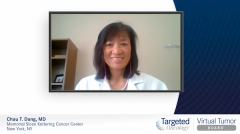
Case 1: Selecting Adjuvant Therapy for Early-Stage HER2+ BC
Shifting their focus to the adjuvant setting, expert panelists review the optimal selection of therapy following surgery in early-stage HER2+ breast cancer.
Episodes in this series

Transcript:
Sara A. Hurvitz, MD: Let's move on and find out what happened to our patient who is being treated. She completed 6 cycles of TCHP [docetaxel, carboplatin, trastuzumab, pertuzumab] and she proceeded to have a mastectomy, given that very large area of enhancement. Previously, she had selected to do this with her surgeon before even doing neoadjuvant therapy. At the time of surgery, she was found to have 6.6 cm of residual DCIS [ductal carcinoma in situ], but she had a pathologic complete response in the breast in terms of invasive cancer and her nodes were negative. Three nodes were removed, and they were all negative. Talk to me now about how you think about the decision-making in the adjuvant setting for this patient who had an ER/PR [estrogen receptor/progesterone receptor]-negative HER2-positive disease at the outset that was biopsy-proven node positive but now has achieved a pathologic complete response with TCHP. What is your thinking in terms of adjuvant treatment? Bill, I'll start with you on this one.
William J. Gradishar, MD: This would have been a situation where back in the day it would have been trastuzumab alone. We have data from the AFFINITY trial—which doesn't perfectly replicate this experience—but nonetheless, in this experience with AFFINITY where patients were node negative, there seemed to be no added benefit from the addition of pertuzumab. That said, this is a patient who was node positive at the outset, not at the time of surgery, being the first step. In the AFFINITY trial, for those patients who were node positive, there was a benefit. Our standard-of-care practice would be to finish out the year of HP [trastuzumab, pertuzumab]. If there are patients that don't tolerate the P [pertuzumab] for the full year, and if we encountered someone like that with this kind of response, I would probably jettison the pertuzumab, but we start out with the idea that we would complete it.
Sara A. Hurvitz, MD: That sounds good. I agree we don't always have a perfect clinical trial by which to support our treatment decisions, and AFFINITY was purely done in the adjuvant setting, not in the post-neoadjuvant setting. That said, Sara, would you agree that HP is what you would give in a patient who was biopsy proven at the outset to be node positive who achieved a past CR [complete response]? Do you feel she did so well that you can drop the pertuzumab?
Sara M. Tolaney, MD, MPH: I would also continue the pertuzumab, and I'll be honest, in general for my patients who achieve pCR [pathological complete response], I've usually just continued the HP for the year if they tolerate therapy well. In this case, it is important to realize that technically not all pCRs are the same, because we do know that baseline pathologic risk is also an independent prognostic indicator even in the setting of pCR. Knowing this patient did have nodal disease up-front, that does make this patient still have a higher risk of recurrence than someone who would've been node negative who achieved PCR. You do want to try to optimize therapy; HP is certainly very reasonable.
Sara A. Hurvitz, MD: If this patient had not achieved pathologic complete response, had some invasive disease in—let's say just the breast alone—then what would your treatment option that you would recommend instead, Sara?
Sara M. Tolaney, MD, MPH: If someone had residual disease, then the standard really should be the 14 cycles of adjuvant T-DM1 [trastuzumab emtansine] based on data we have from CATHERINE that has taught us that for someone with residual disease, you can have a 50% reduction in the rate of an IDFS [invasive disease-free survival] event. That is huge. This was relative to trastuzumab, so it wasn't technically compared to HP, which is what we would currently use. Likely the benefits are going to be a similar difference knowing that this person had residual disease to a pertuzumab-based therapy. That would really be the standard, and in general, for any amount of residual disease, I am offering adjuvant T-DM1.
Sara A. Hurvitz, MD: Bill, I'm going to push you a little further. Assuming you agree with the T-DM1 here, if she had residual disease, let's say she had residual disease as well in the lymph nodes at the time of surgery, would you offer a patient like this neratinib after completing T-DM1? Keeping in mind her tumor was ER/PR-negative, or would you reserve that for hormone receptor-positive?
William J. Gradishar, MD: The ExteNET data is equally not perfectly applicable to this patient. There were a few patients in ExteNET that got pertuzumab; nobody got T-DM1. I found that the patients who are most likely to get neratinib are themselves extraordinarily motivated and often the ones coming in asking for it quite frankly. But to your question more specifically, where the benefit has been seen with neratinib in this setting is for those who have residual disease and who are hormone receptor-positive. In that group, they keep doing analyses of the ExteNET study and with longer follow-up. There is an apparent significant benefit; it is around 8% to 9% at this point for that subset. This patient being hormone receptor-negative, I'm not sure that I would necessarily offer it to the patient based on that data set.
Sara A. Hurvitz, MD: Excellent. Luckily, our patient did have a pathologic complete response and she and her physician elected to go on, and she'll continue HP to complete the 1 year based on the extrapolated data from APHINITY.
Transcript edited for clarity.





















